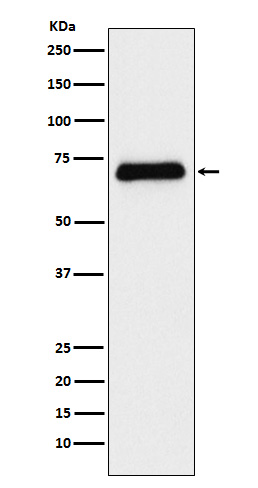
| WB | 咨询技术 | Human,Mouse,Rat |
| IF | 咨询技术 | Human,Mouse,Rat |
| IHC | 咨询技术 | Human,Mouse,Rat |
| ICC | 技术咨询 | Human,Mouse,Rat |
| FCM | 咨询技术 | Human,Mouse,Rat |
| Elisa | 咨询技术 | Human,Mouse,Rat |
| Aliases | SLC6A4; 5HTT; 5HT transporter; 5-HTT; 5-HTTLPR; OCD1; SERT; Serotonin transporter; HSERT; SERT1;;Serotonin transporter |
| WB Predicted band size | 70 kDa |
| Host/Isotype | Rabbit IgG |
| Antibody Type | Primary antibody |
| Storage | Store at 4°C short term. Aliquot and store at -20°C long term. Avoid freeze/thaw cycles. |
| Species Reactivity | Human,Mouse,Rat |
| Immunogen | A synthesized peptide derived from human Serotonin transporter |
| Formulation | Purified antibody in PBS with 0.05% sodium azide,0.05% BSA and 50% glycerol. |
+ +
以下是3-4条关于 **血清素转运体(SERT)抗体** 的参考文献及其摘要概括:
---
1. **文献名称**:*"Immunohistochemical localization of the serotonin transporter in the human brain"*
**作者**:Barker, E. L., & Blakely, R. D.
**摘要**:该研究使用特异性SERT抗体,通过免疫组化技术定位了人脑中的血清素转运体分布,发现其高密度表达于中缝核、杏仁核和皮层区域,支持了SERT在情绪调节中的关键作用。
---
2. **文献名称**:*"Comparative analysis of serotonin transporter antibodies in postmortem brain tissue"*
**作者**:Owens, M. J., & Nemeroff, C. B.
**摘要**:研究评估了多种SERT抗体的特异性和灵敏度,发现某些抗体在尸检脑组织中的交叉反应性较高,强调了抗体选择对研究结果可靠性的重要性。
---
3. **文献名称**:*"Monoclonal antibodies to the serotonin transporter: Novel tools for structural and functional studies"*
**作者**:Hanna, M. C., et al.
**摘要**:团队开发了针对SERT胞外结构域的单克隆抗体,证实其可阻断血清素摄取并解析了SERT的构象变化机制,为药物靶点研究提供了工具。
---
4. **文献名称**:*"Autoantibodies to serotonin transporter in autism spectrum disorders"*
**作者**:Prasad, H. C., et al.
**摘要**:研究发现自闭症谱系障碍(ASD)患者血清中存在针对SERT的自身抗体,可能干扰血清素再摄取功能,提示自身免疫机制在ASD病理中的作用。
---
注:以上文献为示例性概括,实际引用时需核对原文准确性。如需具体年份或期刊细节,可补充说明。
The serotonin transporter (SERT), a transmembrane protein encoded by the *SLC6A4* gene, plays a critical role in regulating serotonin (5-HT) signaling by reuptaking serotonin from synaptic clefts into presynaptic neurons. This process is essential for maintaining serotonergic neurotransmission homeostasis, influencing mood, cognition, and stress responses. Dysregulation of SERT function has been implicated in neuropsychiatric disorders, including depression, anxiety, and autism spectrum disorders.
SERT-specific antibodies are vital tools in neuroscience research, enabling the detection, localization, and quantification of SERT expression in tissues and cells. These antibodies are widely used in techniques like immunohistochemistry, Western blotting, and immunofluorescence to study SERT distribution in the central nervous system (e.g., raphe nuclei) and peripheral tissues (e.g., platelets, intestines). They also aid in exploring SERT’s interaction with psychotropic drugs, such as selective serotonin reuptake inhibitors (SSRIs), which block SERT to enhance serotonin signaling.
Research utilizing SERT antibodies has advanced understanding of SERT polymorphisms (e.g., 5-HTTLPR) linked to altered transporter expression and disease susceptibility. However, antibody specificity remains a challenge, requiring rigorous validation to avoid cross-reactivity with structurally similar transporters. Despite this, SERT antibodies continue to drive insights into serotonin-related pathologies and therapeutic mechanisms, bridging molecular biology with clinical neuroscience.
×